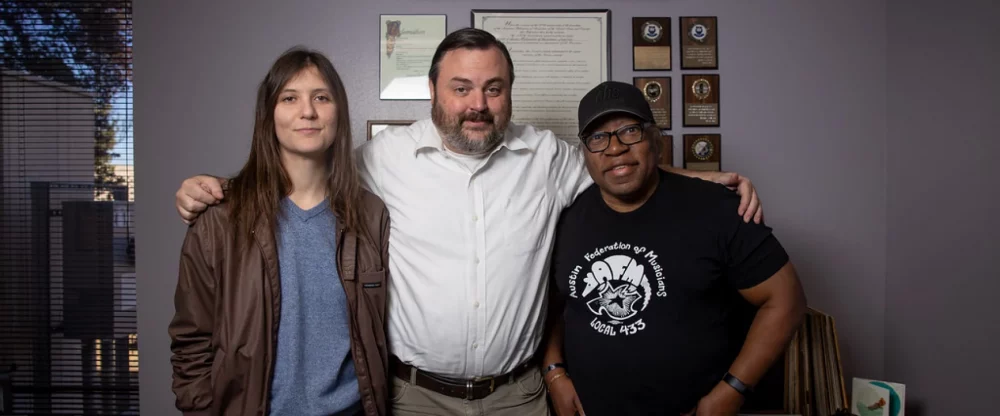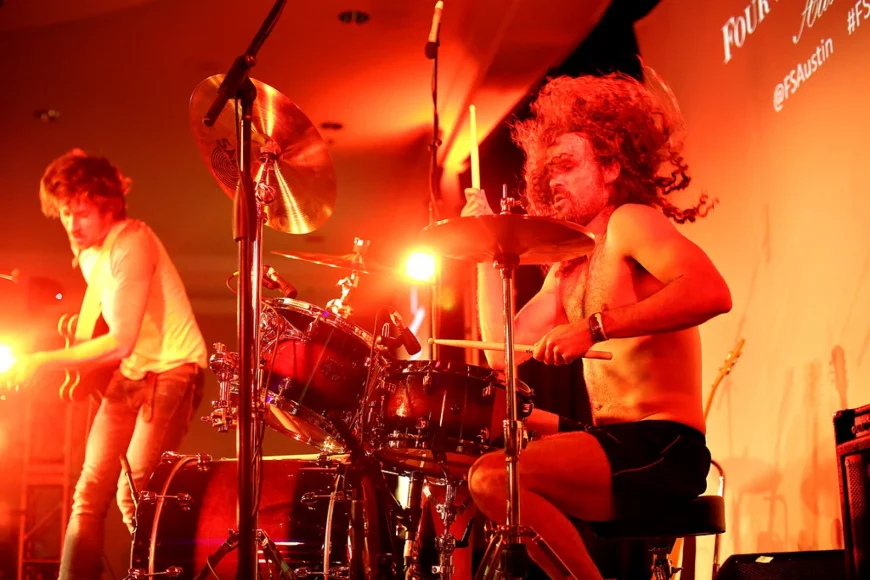KUT 90.5 | By Elizabeth McQueen, Miles Bloxson
Published January 18, 2023 at 5:01 AM CST
From baristas organizing at Starbucks to warehouse workers organizing at Amazon, it seems like labor unions are all over the news lately. But did you know there’s a labor union for musicians in Austin?
Como Las Movies frontman Nelson Valente Aguilar didn’t.
“I’m not aware of any musicians union,” he said on a recent Friday at Cheer-Up Charlies.
The Austin Federation of Musicians, the local chapter of the American Federation of Musicians, has been active in Austin since 1907. Part of the reason musicians may not know about it could stem from confusion about what the union is and how it can benefit them.
Union president Aaron Lack is trying to change that.
“Music work is work,” he says. “And in order to get paid for our work, we have to join together to create worker power, to balance the power of our employers, because they naturally have all the other power. They have the economic power, the organizational power, the administrative power. … And in order for us to counteract that as musicians, to get a fair deal, we have to band together.”
It costs $205 to join the Austin Federation of Musicians. After that, members pay $200 a year in union dues plus additional work dues.
In return, union members get to use standard union contracts with employers and get the union’s full legal support should something go wrong.
“Your employer knows that, too, because they’ve signed the contract,” Lack said. “And that sort of eliminates almost any malfeasance on the part of the employer most of the time. But when it doesn’t, the union legal department is there. And those are all lawyers that work for the AFM full-time that were musicians that went back to school for law. They can’t wait to come down and enforce that contract for somebody, no matter how small it is.”
Having the union legal department enforce contracts can be a real benefit for musicians, who might not be able to afford a lawyer.
“When you’re using your own money … you have to make a value judgment, like, am I going to spend $10,000 in legal fees to recover my $3,000 artist fee that’s being withheld from me?” Lack said. “But when it’s the union, we don’t have to make that value judgment because it’s an industry concern, and it doesn’t matter how small that artist’s fee is or how big it is.”
Union members also look at different kinds of gigs and decide the minimum amount members can charge for them. This wage scale can help members get clear with themselves and with employers on what they should charge to play a show.
That scale doesn’t prevent members from taking more money for gigs; they can make as much money as they can get. But they pay 3% of that minimum wage to the union in work dues — no matter how more much they get paid on top.
Union members can also contribute to a pension. Every time they file a gig through the union, they can contribute a percentage of that minimum wage to the pension. When they reach retirement age, they’ll have a guaranteed income for the rest of their lives.
Freelance musicians can make pension contributions for shows they play, even if the show isn’t a union gig. All they have to do is sign a contract with the bandleader and file that contract with the union.
“I’ve been able to do that in my own experience and career here in Austin with very small local gigs and vest my pension that way,” Lack said.
Being a union member can make it possible for musicians to get paid if recordings they performed on are played in television shows or movies. They can get discounts on insurance plans, loans and more. But the tangible benefits are secondary to the transformational benefits, said Lack and Blair Robbins, the union’s secretary-treasurer.
A native Austinite, Robbins had been playing gigs in the city for around a decade. For a long time, they worked in the service industry while playing low-paying gigs. That struggle started to have negative effects on their mental health.
Then Robbins met Lack and got involved with the union.
“And this concept started to make me see the connection between the economic relationship and the health relationship, including the mental health relationship,” they said. “I started to really see how disenfranchised as a musician I actually was, and that even though I was getting these gigs and these opportunities, I didn’t have a stable financial and employment structure to support myself in the long term.”
Robbins started using union contracts to make details clear with venues and the wage scale to figure out pay.
“Since I started playing gigs again in May, I can see the jump in economic gain for myself,” Robbins said. “And I’m just more organized. I have every contract that I’ve filed that I can access now. So there’s a history and there’s a record.”
Robbins said the union could provide the same benefits for others in the Austin music scene.
“I think that the structure, the union, is really supportive and can elevate all of us,” they said.




